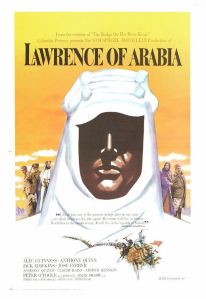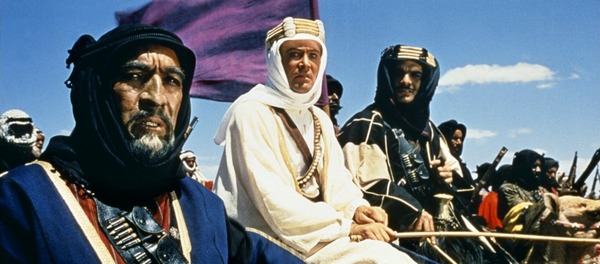This 60s Movie: Lawrence of Arabia (1962)
/
(some spoilers ahead, but nothing major)
Lawrence of Arabia came up as another random 60s movie and of course it’s also one the big classics that I had not seen yet. I know many old movies but still admit that I can get impatient quickly because, well, they’re old and often slow. And I grew impatient in the first 30-50 minutes because I found it slow and the movie is three hours long, so I was scared! But somehow the movie managed to turn around for me and got me more than I expected. It’s a weird movie or maybe just a weird main character but still an intriguing one. Peter O’Toole is great and I was really impressed with the set design and camera work. You have to be impressed seeing all those amazing shots, towns and masses of people and realizing this was long before the convenience of CGI. I think, it’s worth for these moments alone. The work that director David Lean has put into the movie is very visible. It is a good movie if you have the patience. I didn’t really get much of a 60s vibe from the movie, though. Maybe it’s a bit darker than I expected, especially the second half went down some surprising roads, but I didn’t see too much of the typical zeitgeist. Then again, the movie and O’Toole didn’t shy away from portraying Lawrence as clearly homosexual (Lean thought he was although experts say it’s not clear).
But there is one thing I thought of: there is a trope called White Savior, which basically means there is one white, Western, civilized person who helps/teaches/saves other non-white people. Good examples are Avatar (a reason why I don’t like that movie), The Blind Side (the same) and some even say 12 Years a Slave (but I already explained why I don’t agree with that reading). The problem with that trope is that it makes non-whites (or often indigenous people) look totally helpless, so that only white people are able to help them. It makes white look superior and non-whites inferior. Which explains why white storytellers like to use that trope.
In Lawrence of Arabia Lawrence is sent to help the Arabs fight against the Turks during World War I. The Arabs are sceptical at first but he convinces them by, well, being a really great and wise guy. Later it does seem like they rely on him and his strategies, so that they make him one of them, dressing him in Arab robes, making him the titular Lawrence of Arabia instead of the British Lawrence. Some people claim that he is not a White Savior because for one he rejects that role and second he questions himself and his methods in the end. So can he be the superior white man if he doesn’t think so himself?
I’m not sure. There are moments where he clearly enjoys being celebrated as the ‘new Arab’ but he always shows the Arabs a lot of respect. And he does question himself and especially his willingness to use violence against the enemies, so that he comes across as a self-reflective person who struggles with the image that others see in him. But I still think the movie emphasizes him as the White Savior, even if he doesn’t think so himself. In the end, he questions his humanity and is desperate for having at times enjoyed killing people. We are supposed to feel sorry for him and to view his struggle as somewhat honourable (which it is). But we never see the Arabs feel any of those doubts. They have no problem using violence, no guilty conscience, they are even shown as greedy in some moments.

I appreciate the movie as it is, but I felt uncomfortable at times with the juxtaposition of the upright Lawrence and the thoughtless Arabs. There were exceptions for sure and I didn’t see a clear stereotypical portrayal of them but I’m still not sure the movie doesn’t rely on the White Savior trope. Which in the end is okay to me, since it’s still a movie from 1962 and for that time it is almost progressive.

